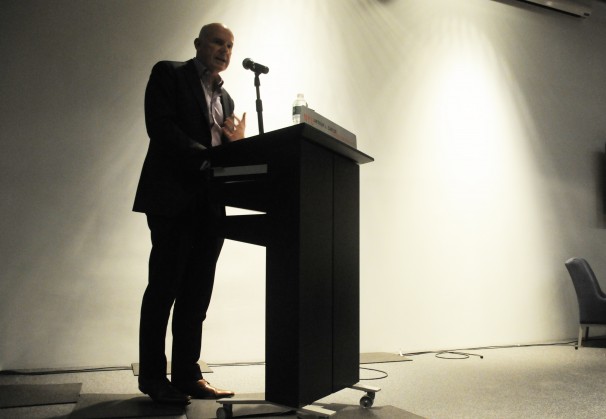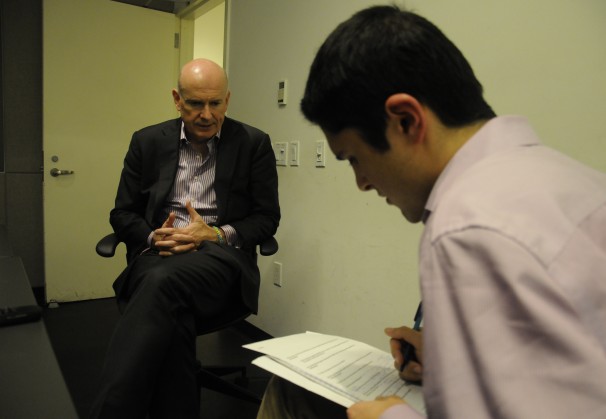
After Gerard Baker’s lecture at the journalism school, WSN sat down with the managing editor of The Wall Street Journal for an exclusive, one-on-one interview.
Q: Was there a mentor you had or a moment you can point to specifically that led you to where you are today?
A: I was very lucky to have a number of very good mentors in my life. I think the first real mentor I had was a professor at college who was my politics and history teacher. He first taught me the virtues of objective study and objective analysis. Like a lot of 18- and 19-year-olds, I went to college thinking I knew everything and had very strong views about things. And he was just a great historian and political scientist who had his own views but was absolutely brilliant at dissecting views of all opinions. And he taught me to see arguments and to see issues from multiple sides. But he really taught me the rigor of how to get to the truth by coming at it in as objective a way as is possible.
I think another mentor of mine was someone who was the economics editor at BBC, when I was an economics correspondent, who similarly was a incredibly smart guy who taught me to come at issues in a more objective way, in a way that more tried to understand the underlying causes that were at work.
Q: What would you say is the guiding philosophy for The Wall Street Journal in choosing what to cover and how to cover it?
A: I think the guiding philosophy is we’re first and foremost a newspaper that covers the most important business, financial and economic news in the world for an audience that is highly intelligent, highly sophisticated and very engaged in many of these issues. We want to be first with the news and also with explaining and interpreting the news. But at the same time, as pursuing that as our primary objective, we have an opportunity to reach a broader audience. There is a broader audience out there for our journalism by doing things that are not the core but are actually culture and arts and politics and sport and entertainment, and bringing the values and principles of The Wall Street Journal to a much wider readership through that.

Q: You mentioned in the lecture that a lot of revenues have been going down for traditional media, but you are also mentioning that you are expanding with culture, arts and topics that The Wall Street Journal has not covered before. How do you balance that simultaneously?
A: We’ve been fortunate that News Corporation, our parent company, has invested in us and has decided to make some big bets on our journalism and has decided that quality journalism — accurate, fair, reliable journalism — really does have a future. We still make money. We don’t make a lot of money, but we make money. It’s partly because our journalism has been invested in and has been so strong that that investment has paid off.
Q: What kind of advice do you have for students studying journalism?
A: Pursue journalism as far as you can because it’s terribly important. We live in the so-called information age, and it is the information age. We have amazing access to information of all sorts. But the need for somebody, an institution, an organization that tells you what’s really going on in the world with this barrage of information is greater than ever — and explaining it, reporting it, being first with the news, being first to tell you what’s happening, doing it in a way that is intelligible and explains the background and explains these great forces at work. If you’re interested in history and you’re interested in understanding the forces that are shaping the world minute by minute, day by day, then pursue journalism. That’s the way you get a fantastic ringside seat, whether it’s in business or politics or culture or anything else. You get a firsthand view of history unfolding. But more importantly, you get an opportunity which is really, really rare to tell that history and to explain it.
Q: What does a day in the life look like for the managing editor of The Wall Street Journal?
A: A lot of meetings. A large part of my job is running a large organization. We have 1,850 journalists, and I’m responsible for running that organization, so a large part of that is obviously management. So there’s a lot of management meetings and budget meetings and personnel meetings and all these kind of things. But I make sure that every day I’m actively involved in the journalism. I chair news meetings a couple of times a day. I read a lot of copy during the day, make sure we’re doing the right stories and we’re doing them the right way. I listen a lot to what my editors and reporters tell me we’re doing and what we should be doing. A lot of meetings, a lot of managerial meetings, a lot of stuff that sometimes can be quite arduous. But the joy is that every day I get to engage in real journalism. And I get to make decisions about journalism, and I get to listen and to understand better what’s going on. And that’s what makes the job so much fun.
Q: Do you feel that the paper is pressured to include more visual elements like graphics and multimedia?
A: Yes. We have to. As people become more and more digital consumers of news, they want to be able to consume it all kinds of ways, whether that’s through graphics, through pictures, through video, through sound obviously, even through music. It’s a much more multimedia experience, and we’ve got to be much better at that than we have been.
Q: How do you balance creating a conversation with your subscribers and readers and also providing high-quality journalism?
A: I don’t, in the end, see that there’s a conflict. I think what we’re trying to do is to provide, as I said, the best journalism primarily in the business, economic and financial field, but also reaching a broader audience. Our subscribers expect that. They pay a lot of money for Wall Street Journal journalism, and I’m very grateful for that. And I’m very proud of what we do. We need to make sure that we’re providing them with the best journalism every day.
Q: You mentioned that the editorial page is conservative. Is that something that is just good business? Do you want to push for a bipartisan element for the page?
A: I don’t speak for the editorial page because the editorial page is completely independent of the news. But it is conservative, and it is very much a part of The Wall Street Journal’s appeal. It’s different from what we do [with news]. We pursue journalism without a skew, without an ideological standpoint. But The Journal’s editorial pages are a very, very valuable part of what we do.
Q: What are the newspapers that you like to read? What do you have at your doorstep in the morning?
A: I have The Journal obviously. I have The New York Post, which I always like to read because I think a lot of its coverage of New York is very good, and some of its coverage of business is very good, too. And honestly, I love its coverage of sports. The New York Times I read because it’s obviously a major competitor. I want to see how they’re covering the major news of the day. [They cover] many of the same stories that we do, but they do it in a different way, and I want to see what else they’re doing that we’re not doing. [I read] The Financial Times because it’s got a global economic approach, and we do, too. And I want to see, again, how they approach things from a global perspective. Increasingly, I spend a lot of my day looking at digital news whether it’s on the traditional news websites or whether it’s things like Huffington Post, Drudge, Business Insider, Buzzfeed or any bloggers, news aggregating sites or tech news coverage. I’ve been looking at a lot of tech news coverage recently. I read a lot of stuff every day.
Q: In 10 years, where do you see The Wall Street Journal? What goals will you have accomplished? What will still need work?
A: I want us to reach an even larger audience than we do right now. We currently have 2.4 million subscribers in the United States. I want us to be bigger than that. Even more than we are now, I want us to continue to be the dominant news organization for coverage of business and finance. I want us to reach a broader audience and get further in that direction. I want us to be more global, to have a much bigger global presence. We’re big internationally. We have international editions. We have local language editions. But I think we could be even bigger. I think we could be the undisputed source for the most reliable, best, most insightful news reporting and analysis and events around the world. I have big global ambitions for us, so I’d like us to be there.
Michael Domanico is a news editor. Email him at [email protected].




















































































































































